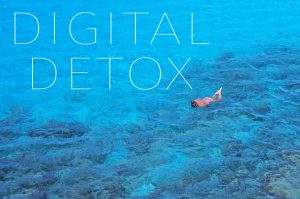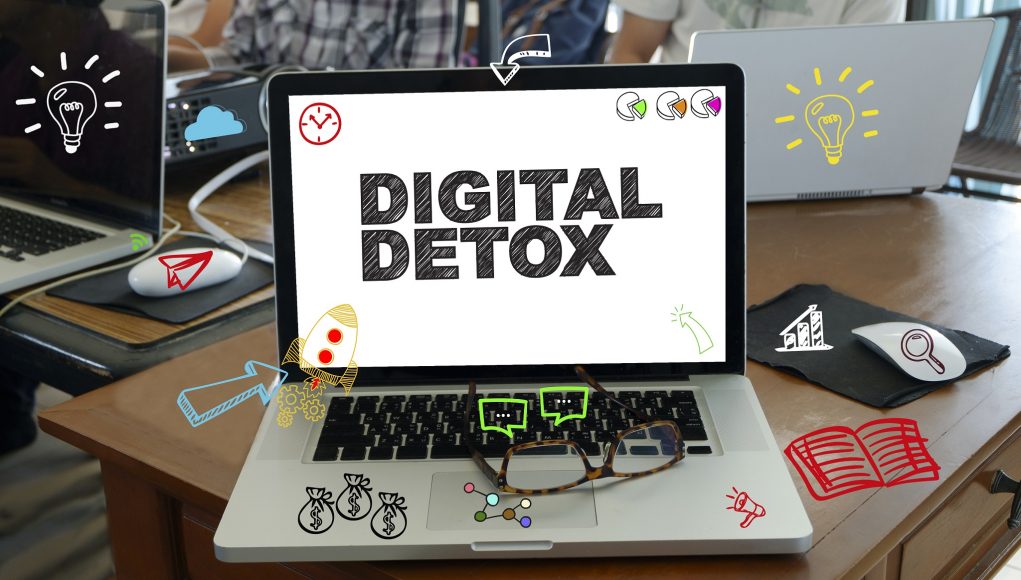19 Steps to Digital Detox: Switch Off to Stay Sane
This is the age of the digital where we are evolving in tandem as (wo)man and machine. Smart phones have become our extended limbs and Google is fast replacing the functions of the human brain.
On an average, a person will check their phone 200 times a day and find it impossible to go even half a day without it. A quarter of the global population spends more time online than asleep and every month, an average teenager will send roughly 3500 text messages from bed!
In this age of information glut, our increasing dependence on the very technologies that were developed to simplify our lives now poses severe and long-term implications to our health. This dependence on (and growing addiction to) technology, devices and the Internet has become toxic and detrimental to an individual’s physical, emotional, mental and spiritual wellbeing.
Digital detox basically means – unplug, put away your computer/phone/iPad/iPod and focus on life as we knew it, what we now call – ‘offline’.
Here are some ways to go on a digital detox:
- Entertainment: Go back to pursuing your hobbies/interests and learn how to entertain yourself without the use of a screen.
 Health: Increasing screen time has serious consequences on our brains and bodies. Make a choice not to be a household with multiple flatscreens and iPads. Function out of necessity not luxury. The light emitted from any screen hampers the production of a hormone called ‘melatonin’ that is crucial to quality sleep. Charge your electronics away from your bedroom.
Health: Increasing screen time has serious consequences on our brains and bodies. Make a choice not to be a household with multiple flatscreens and iPads. Function out of necessity not luxury. The light emitted from any screen hampers the production of a hormone called ‘melatonin’ that is crucial to quality sleep. Charge your electronics away from your bedroom.- Meditation: Be still and quiet the constant monologue in your mind. It may sound like ridiculous advice but just ‘space out’ and live in the present moment, or even better, practice the zen art of just being.
- Unplug: Our careers and progress at work depend on being connected to the Internet. However, it is important to schedule and build offline work into your day. If you have the kind of job that requires you to be reachable 24×7, it helps to use out-of-office notifications for a few hours or let colleagues know that you are offline but reachable via mobile if anything urgent comes up. During this time, also switch off audio pings and alerts, changing to hourly as opposed to real-time updates.
 Offline spaces: This constant connectivity greatly impacts our circadian rhythm, or in simpler terms – sleep cycle. Create ‘offline spaces’ in your home and office where you can go to ‘unplug’. Remember, a disrupted sleep cycle leads to life-altering diseases. It helps to ban all electronics from the bedroom so it becomes a space solely for rest and rejuvenation.
Offline spaces: This constant connectivity greatly impacts our circadian rhythm, or in simpler terms – sleep cycle. Create ‘offline spaces’ in your home and office where you can go to ‘unplug’. Remember, a disrupted sleep cycle leads to life-altering diseases. It helps to ban all electronics from the bedroom so it becomes a space solely for rest and rejuvenation.- No ‘Facebookcrastination’: When you start your day, get straight to work. Do not create a dependency on having to check Facebook or Instagram first – this cripples your productivity in the long run.
- Mix it up: Ever so often, get back to using pen and paper for notes, writing and drawing.
- Less social media: Check social media infrequently, and on a computer, refrain from downloading the apps on your phone; it helps when Twitter, Insta or Facebook don’t follow you around, beeping throughout life as you live it. Stick to a posting schedule so you do not go overboard. Social media is a real blackhole for time, so remember, you use Facebook – Facebook doesn’t use you.
- Nighttime reading: Reading a book (paper and print) is far less disruptive than reading on your phone or tablet. Also, read in amber or non-LED light, but if you do not have this option – use blue-blocker glasses to help your brain gradually wind down.
 Phone etiquette: When you sit at a table for meals, coffee or just conversation, lay your phone face down so you are not tempted to constantly check when notifications arrive. When you’re out with friends at a restaurant or pub, make a ‘phone stack pact’ by placing your phones one on top of the other in the center of the table and ensuring none of you’ll are on it while spending time together. Have no-phone days at home, like a Sunday when the whole family is around. Make it a point to stay away from phones and devices when on vacation.
Phone etiquette: When you sit at a table for meals, coffee or just conversation, lay your phone face down so you are not tempted to constantly check when notifications arrive. When you’re out with friends at a restaurant or pub, make a ‘phone stack pact’ by placing your phones one on top of the other in the center of the table and ensuring none of you’ll are on it while spending time together. Have no-phone days at home, like a Sunday when the whole family is around. Make it a point to stay away from phones and devices when on vacation.- Go old school: Get a watch to tell you the time as opposed to a ‘smart watch’ and an alarm to wake you up each morning so your phone isn’t the first thing you engage with on waking up.
- Tell the world: Inform friends and family of your digital detox, this will help you calm potential #FOMO (fear of missing out) and also pressurize you to keep at it when the going gets tough.
- Quiet time: There are those default pockets of free time, like when walking the dog or going to the shop to buy groceries. Optimize quiet time such as this, let your mind wander.
- Compare lists: List all your electronic devices, and the time you spend on them on a daily basis. Then compare this with a list all the things you want to be doing but (not surprisingly) have not found the time for.
- Keep it real: Digital detoxes are good to undertake bi-annually or more frequently, but what’s even better is to adopt a lifestyle that allows you to detox daily. Keep it real and do not set unachievable expectations.
 Real world versus virtual world: Seize opportunities that have you to spend more time in the real world, like having lunch with friends and family, rather than in front of your television or laptop screen.
Real world versus virtual world: Seize opportunities that have you to spend more time in the real world, like having lunch with friends and family, rather than in front of your television or laptop screen.- Detox buddy: It helps to have a partner-in-positivity, so to speak, for moral support and validation when the going gets tough.
- Quality break time: When you take breaks, go for a walk, sit under a tree, immerse yourself in physical activity or just strike a conversation and socialize – aim to be less dependent on technology to cut loose.
- Be good company: When you are in the company of others, be present. Give them your whole-hearted attention, take interest, actively listen to what is being said, participate and engage in the conversation. Be a quality and purposeful communicator.
The benefits of digital detoxing are powerful, from enhanced mental health to better quality sleep; good posture to more satisfying personal relationships; increased mindfulness, productivity and stress-free living.
What’s more? Research has actually found differences in the brain size and connectivity of those who use the Internet heavily as opposed to those who do not. ‘Internet abuse’ as it is now being referred to, is also responsible for a person’s deteriorating ability to self-regulate, and to set and achieve long-term goals, overall concentration and attention span.
Learn more about this phenomenon in ‘Blue light has a dark side’: http://www.health.harvard.edu/staying-healthy/blue-light-has-a-dark-side












































